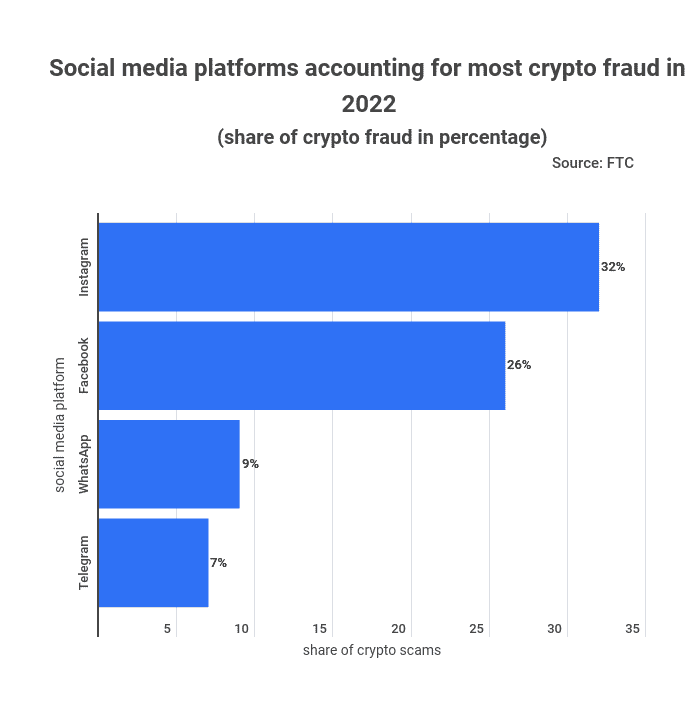As exciting as crypto may be, its lack of regulation has made it susceptible to scams in recent years. Most cyber attackers demand ransom in virtual currency. Besides, several online bandits are using social media to scam unsuspecting victims.
According to a TradingPlatforms analysis, Instagram accounts for 32% of all fraud cases on social media. Most scammers find it easy to lure and scam unsuspecting victims on Instagram. Facebook and Whatsapp assumed the second and third spots with 26% and 9%, respectively.
Commenting on the data, TradingPlatform.com’s Edith read said this. “The most vulnerable sites for scamming are meta-owned. This raises questions about Meta’s capacity to protect its users’ personal information and privacy.” She further said that users must be on the outlook for suspicious behaviors to avoid losses. “To avoid instances of fraud, one must be on the lookout for suspicious behavior. Don’t ignore any red flags,” She said.
Investments and romance scams lead the pack.
Most recorded crypto scams originated on social media as investment fraud. TradingPlatforms’ analysis shows that investment frauds resulted in the loss of crypto worth $575 million. That is a significantly higher amount than any other sort of fraud.
The stories that people tell about these frauds describe a perfect storm. The dangling carrot is a promise of quick money. Besides, scammers exploit people’s inadequate understanding and experience of cryptography.
Scammers use the allure of big money
Scam artists in the crypto investment industry promise significant returns for their victims. Yet, the “investments” in cryptos are transferred directly into the wallet of the con artist.
To gain the victim’s trust, scammers trick victims into believing they can track their bitcoin through Instagram. However, this information is fabricated.
Some individuals state that they made a modest withdrawal as a “test,” which persuaded them to go all in. Yet, they get a notification to deposit extra transaction fees regarding actual withdrawals. Despite the additional deposit, they don’t receive the original funds back.
How to be safe
There are several reasons why online crypto scamming thrives. For example, the crypto trade doesn’t involve banks. Therefore, it is difficult to flag fraudulent activities. On the other hand, most victims are ignorant of how cryptocurrency works.
Yet, few safeguards are in place to protect consumers from scams in the crypto market. Here are some pointers. First, it’s only scammers who’ll ask you to pay in bitcoin before purchasing or securing your money.
Secondly, scammers frequently promise large sums of money in exchange for a small risk. TradingPlatforms deems this to be a significant red signal. Investing in crypto can be incredibly risky, and no one should promise a profit.


Question & Answers (0)